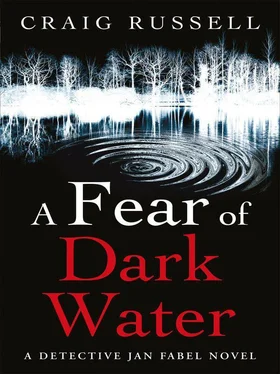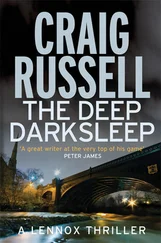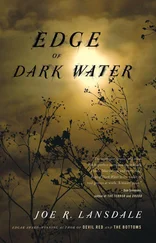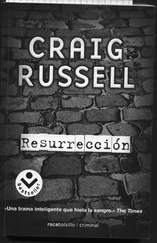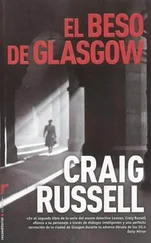Craig Russell - A fear of dark water
Здесь есть возможность читать онлайн «Craig Russell - A fear of dark water» весь текст электронной книги совершенно бесплатно (целиком полную версию без сокращений). В некоторых случаях можно слушать аудио, скачать через торрент в формате fb2 и присутствует краткое содержание. Жанр: Триллер, на английском языке. Описание произведения, (предисловие) а так же отзывы посетителей доступны на портале библиотеки ЛибКат.
- Название:A fear of dark water
- Автор:
- Жанр:
- Год:неизвестен
- ISBN:нет данных
- Рейтинг книги:5 / 5. Голосов: 1
-
Избранное:Добавить в избранное
- Отзывы:
-
Ваша оценка:
- 100
- 1
- 2
- 3
- 4
- 5
A fear of dark water: краткое содержание, описание и аннотация
Предлагаем к чтению аннотацию, описание, краткое содержание или предисловие (зависит от того, что написал сам автор книги «A fear of dark water»). Если вы не нашли необходимую информацию о книге — напишите в комментариях, мы постараемся отыскать её.
A fear of dark water — читать онлайн бесплатно полную книгу (весь текст) целиком
Ниже представлен текст книги, разбитый по страницам. Система сохранения места последней прочитанной страницы, позволяет с удобством читать онлайн бесплатно книгу «A fear of dark water», без необходимости каждый раз заново искать на чём Вы остановились. Поставьте закладку, и сможете в любой момент перейти на страницу, на которой закончили чтение.
Интервал:
Закладка:
‘Do you know Victoria Kempfert?’
‘We have never met.’
‘Do you have any idea why someone would want to harm your husband, or kill him?’
‘I was led to believe Daniel’s death was an accident…’ It was Wiegand who spoke. ‘Well, not an accident, but I thought the intent of the attackers had been to set fire to the car while Daniel was inside the cafe.’
‘Frau Fottinger?’ Fabel ignored Wiegand’s interruption.
‘No. Not on a personal level. Daniel was not the kind of person to make enemies. But it’s possible that some groups would view him with some distrust, because of the company’s activities.’
‘Such as?’
‘Fottinger Environmental Technologies is a leader in sea-based carbon-capture technology. And Daniel was a key mover and organiser behind the GlobalConcern Hamburg summit.’
‘Why would anyone object to carbon capture?’
‘It’s the way we do it. Daniel perfected a more efficient way of iron seeding.’
‘Iron seeding?’
‘Perhaps I can explain,’ said Wiegand. ‘It was in this area that Herr Fottinger’s company cooperated with the Korn Corporation. Iron seeding is exactly how it sounds: it involves seeding deep ocean with iron dust.’
‘For what purpose?’ asked Fabel.
‘Put simply: to trap atmospheric carbon dioxide at the bottom of the ocean. The theory has been around for a time and there have been trials — with mixed results. I would guess that even officers of the Polizei Hamburg are aware that the main danger we face on the planet is the increase of CO 2 in the atmosphere, leading to catastrophic global warming. The two main causes are emissions into the atmosphere and deforestation, which is reducing the Earth’s biosphere’s ability to process carbon dioxide. What do you know about plankton, Herr Fabel?’
‘Whales eat it. That’s about it.’
‘There are two types of plankton: phytoplankton and zooplankton. Effectively, phytoplankton is microscopic plant life, zooplankton is microscopic animal life. The principle of iron seeding is that the iron dust seeded into the ocean acts as a fertiliser. It causes an explosion in the population of phytoplankton. And phytoplankton, because it’s plant based, employs the process of photosynthesis: it absorbs carbon dioxide and releases oxygen back into the atmosphere. In fact, even as it stands, a huge percentage of the planet’s “breathing” is done by phytoplankton. The theory is that by increasing the volumes of phytoplankton in the ocean, we can take up the slack created by a reduction in rainforest and other large vegetation on land. In many of the tests, there have indeed been massive increases in the levels of phytoplankton. The process of photosynthesis also creates organic materials, sugars, which cause the phytoplankton to sink out of the light and into the dark levels of the ocean, effectively locking up the carbon in the sea floor. The irony is that this dead plankton would, over geological time, eventually become mineral oil.’
‘So why isn’t everyone running out to do this?’ asked Fabel.
‘There is a problem. Put crudely, plants make oxygen, animals make carbon dioxide. Zooplankton, which creates CO2, also lives in the sunlit levels of the ocean, and it feeds on phytoplankton. That has meant that in some of the iron-seeding trial areas, the zooplankton has increased in equal proportion to the phytoplankton. It threatens to neutralise the benefit of iron seeding. That is why, with some segments of the eco-protection community, iron seeding remains a controversial topic. Some see it as a danger, not a remedy.’
‘Enough to earn Herr Fottinger enemies who are willing to kill?’
Wiegand shrugged. ‘You’re the policeman, Herr Fabel.’
‘If this iron seeding is so controversial, why were you and Fottinger Environmental pursuing it?’ asked Fabel. He became aware that he was not questioning the person he had come to question, but allowed himself to be deliberately diverted for the moment.
‘Because if we can iron out the problems, if you’ll pardon the pun, then the benefits are potentially enormous. It could literally save all our lives. The other reason is that Daniel’s researchers are close to developing potential fixes. They are adding elements to the mix that would speed up the process, causing the phytoplankton to sink much faster. Zooplankton cannot survive below three hundred metres, so if we can drop greater amounts of phytoplankton below that level after photosynthesis but before the zooplankton has a chance to feed on it, then we have our solution.’
‘I see. Do you have rivals… competitors in this area?’
Wiegand laughed. ‘No one who would kill to get ahead. The environmental-technology industry does not work that way. The planet always comes before the profit.’
Fabel turned his attention back to Kirstin Fottinger. He ran through the usual questions, establishing as detailed a chronology of the dead man’s movements as possible. When Fabel was finished, he went through what he had been told.
‘Going by what you have told me, Frau Fottinger,’ he said, ‘your husband spent — in fact, both of you regularly spent — upwards of six hours an evening on the internet or otherwise using computers?’
‘That’s correct,’ she said blankly, the porcelain face devoid of any hint that such behaviour should be considered odd. ‘It was part of his work and who he was. Who I am, as well. We both liked to remain connected.’
Fabel nodded and let it go, but made a mental note to discuss with his team the possibility of getting a warrant to examine Fottinger’s computers. No, it would be futile. By the time the Polizei Hamburg’s experts got into the computers, the Pharos Project’s even better experts would have removed anything that might have proved embarrassing for the cult.
‘Your husband knew Berthold Muller-Voigt quite well, I believe.’
‘Not well. Naturally, they encountered each other frequently.’
‘But Herr Muller-Voigt was a director of Fottinger Environmental Technologies…’
‘A non-executive director. Berthold’s function was one of adviser.’
‘I would have thought that that would create a conflict of interest for him as Environment Senator.’
‘He lodged it with the Senate as a declared interest. In any case, our company does not operate in the Hamburg area. There are no contracts to be awarded or the like.’
‘But you do understand that I have to examine any connections between your husband and Senator Muller-Voigt?’
‘Do you really think there’s a connection?’ asked Wiegand. ‘They died under different circumstances, didn’t they? Poor Daniel’s death may not even have been intended and, from what I’ve read, Berthold was murdered by someone he had let into his home.’
Fabel turned to Wiegand and held him in his stare for a moment. The agenda behind the last remark was clear: Wiegand knew, somehow, that Fabel had been in Muller-Voigt’s house shortly before he died.
‘I don’t know if there is a connection or not,’ said Fabel. ‘Yet. I take it you knew Berthold too.’
‘As a matter of fact, I did. Obviously our paths crossed because of our mutual involvement in environmental affairs.’
‘I see,’ said Fabel. ‘Did you ever meet his partner? Meliha Yazar?’
‘I can’t say I did,’ said Wiegand, with nothing to read on his face.
‘Frau Fottinger?’
‘The name is not familiar,’ she said. ‘I thought that Berthold was not exclusive with anyone. He had a reputation as a ladies’ man, as I’m sure you’re aware.’
Fabel thanked Kirstin Fottinger, expressed his sympathy for her loss once more, and took his leave of her. He knew he was a character leaving a stage: nothing about the interview had been natural or spontaneous. There was nothing more to find out here. As he had on the way in, Peter Wiegand made sure to act as Fabel’s escort as the detective left.
Читать дальшеИнтервал:
Закладка:
Похожие книги на «A fear of dark water»
Представляем Вашему вниманию похожие книги на «A fear of dark water» списком для выбора. Мы отобрали схожую по названию и смыслу литературу в надежде предоставить читателям больше вариантов отыскать новые, интересные, ещё непрочитанные произведения.
Обсуждение, отзывы о книге «A fear of dark water» и просто собственные мнения читателей. Оставьте ваши комментарии, напишите, что Вы думаете о произведении, его смысле или главных героях. Укажите что конкретно понравилось, а что нет, и почему Вы так считаете.
